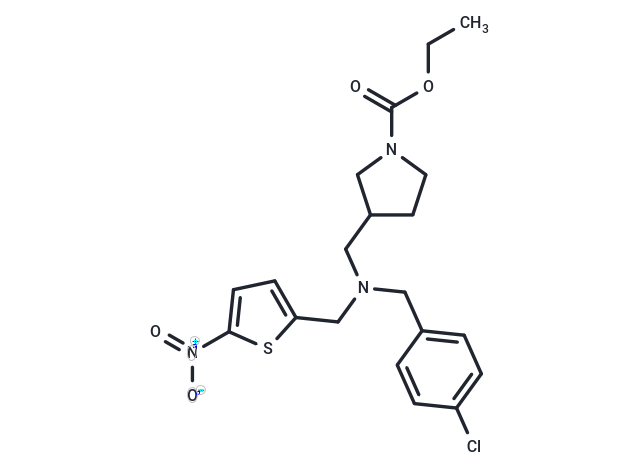- Remove All
 Your shopping cart is currently empty
Your shopping cart is currently empty
Shopping Cart
SR9009
Catalog No. T3685Cas No. 1379686-30-2
Alias Stenabolic, REV-ERB Agonist II
SR9009 (Stenabolic), a REV-ERB agonist, increases the constitutive repression of genes regulated by REV-ERBα/ERBβ (IC50: 670/800 nM). Through activation of REV-ERB, SR9009 can decrease circadian locomotor activity during the dark phase and alter the expression pattern of core clock genes in the hypothalami of mice. The circadian pattern of expression of an array of metabolic genes in the liver, skeletal muscle, and adipose tissue was also altered in mice exposed to SR9009, resulting in increased energy expenditure. In Diet-induced obese mice, SR9009 (100 mg/kg, i.p., b.i.d., for 30 days) could decrease fat mass and markedly improve dyslipidemia and hyperglycemia.

SR9009
Catalog No. T3685Alias Stenabolic, REV-ERB Agonist IICas No. 1379686-30-2
SR9009 (Stenabolic), a REV-ERB agonist, increases the constitutive repression of genes regulated by REV-ERBα/ERBβ (IC50: 670/800 nM). Through activation of REV-ERB, SR9009 can decrease circadian locomotor activity during the dark phase and alter the expression pattern of core clock genes in the hypothalami of mice. The circadian pattern of expression of an array of metabolic genes in the liver, skeletal muscle, and adipose tissue was also altered in mice exposed to SR9009, resulting in increased energy expenditure. In Diet-induced obese mice, SR9009 (100 mg/kg, i.p., b.i.d., for 30 days) could decrease fat mass and markedly improve dyslipidemia and hyperglycemia.
| Pack Size | Price | Availability | Quantity |
|---|---|---|---|
| 1 mg | $31 | In Stock | |
| 2 mg | $48 | In Stock | |
| 5 mg | $63 | In Stock | |
| 10 mg | $98 | In Stock | |
| 25 mg | $162 | In Stock | |
| 50 mg | $288 | In Stock | |
| 1 mL x 10 mM (in DMSO) | $63 | In Stock |
Bulk & Custom
Add to Cart
Questions
View MoreSelect Batch
Purity:99.8%
Contact us for more batch information
All TargetMol products are for research purposes only and cannot be used for human consumption. We do not provide products or services to individuals. Please comply with the intended use and do not use TargetMol products for any other purpose.Product Introduction
Bioactivity
Chemical Properties
| Description | SR9009 (Stenabolic), a REV-ERB agonist, increases the constitutive repression of genes regulated by REV-ERBα/ERBβ (IC50: 670/800 nM). Through activation of REV-ERB, SR9009 can decrease circadian locomotor activity during the dark phase and alter the expression pattern of core clock genes in the hypothalami of mice. The circadian pattern of expression of an array of metabolic genes in the liver, skeletal muscle, and adipose tissue was also altered in mice exposed to SR9009, resulting in increased energy expenditure. In Diet-induced obese mice, SR9009 (100 mg/kg, i.p., b.i.d., for 30 days) could decrease fat mass and markedly improve dyslipidemia and hyperglycemia. |
| Targets&IC50 | Rev-Erbβ:800 nM, Rev-Erbα:670 nM |
| In vitro | SR9009 effectively inhibits transcription in a cotransfection assay using full-length REV-ERBα along with a luciferase reporter driven by the Bmal1 promoter (SR9009 IC50: 710 nM). SR9009 suppresses the expression of BMAL1 mRNA in HepG2 cells in a REV-ERBα/β-dependent manner. |
| In vivo | SR9009 inhibits the activity of the SCN clock, with reversible inhibition of circadian oscillations in SCN explants cultured from the Per2: Luc reporter mouse. |
| Cell Research | SR9009 is dissolved in DMSO and diluted with appropriate media[1]. HEK293 cells are grown in 96-well plates (1×106/well) and are transiently transfected using Lipofectamine. Cells are transfected with a total of 200 ng of DNA per well consisting of the pGL4 mIL-17 firefly luciferase reporter construct, the pGL4 mIL-17 + CNS-5 firefly luciferase reporter construct, or the pGL4 mIL-17 2kB RORE mutant (100 ng/well) , an actin promoter Renilla reniformis luciferase reporter (50 ng/well), and either control vector alone or the test DNA (full-length RORα or full-length RORγ at 50 ng/well). All 48 human nuclear receptors are represented in the specificity assay and SR9009 is tested at a concentration of 20 μM. The format of the assay is a cotransfection assay with Gal4 DNA binding domain-nuclear receptor fusions in HEK293 cells[1]. |
| Alias | Stenabolic, REV-ERB Agonist II |
| Molecular Weight | 437.94 |
| Formula | C20H24ClN3O4S |
| Cas No. | 1379686-30-2 |
| Smiles | CCOC(=O)N1CCC(CN(Cc2ccc(s2)[N+]([O-])=O)Cc2ccc(Cl)cc2)C1 |
| Relative Density. | 1.327 g/cm3 (Predicted) |
Storage & Solubility Information
| Storage | store at low temperature | Powder: -20°C for 3 years | In solvent: -80°C for 1 year | Shipping with blue ice. | |||||||||||||||||||||||||||||||||||
| Solubility Information | DMSO: 100 mg/mL (228.3 mM), Sonication is recommended. | |||||||||||||||||||||||||||||||||||
Solution Preparation Table | ||||||||||||||||||||||||||||||||||||
DMSO
| ||||||||||||||||||||||||||||||||||||
Calculator
In Vivo Formulation Calculator (Clear solution)
Please enter your animal experiment information in the following box and click Calculate to obtain the mother liquor preparation method and in vivo formula preparation method:
Mother liquor preparation method: 2 mg of drug dissolved in 50 μL DMSO (mother liquor concentration of 40 mg/mL), if you need to configure a concentration that exceeds the solubility of the product, please contact us first.
(mother liquor concentration of 40 mg/mL), if you need to configure a concentration that exceeds the solubility of the product, please contact us first.
Preparation method for in vivo formula: Take 50 μL DMSO main solution, add 300 μLPEG300
main solution, add 300 μLPEG300 mix well and clarify, then add 50 more μL Tween 80, mix well and clarify, then add 600 more μLddH2O
mix well and clarify, then add 50 more μL Tween 80, mix well and clarify, then add 600 more μLddH2O mix well and clarify
mix well and clarify
For Reference Only. Please develop an appropriate dissolution method based on your laboratory animals and route of administration.
Dose Conversion
You can also refer to dose conversion for different animals. More Dose Conversion
Tech Support
Please see Inhibitor Handling Instructions for more frequently ask questions. Topics include: how to prepare stock solutions, how to store products, and cautions on cell-based assays & animal experiments, etc
Related Tags: buy SR9009 | purchase SR9009 | SR9009 cost | order SR9009 | SR9009 chemical structure | SR9009 in vivo | SR9009 in vitro | SR9009 formula | SR9009 molecular weight

Copyright © 2015-2025 TargetMol Chemicals Inc. All Rights Reserved.



